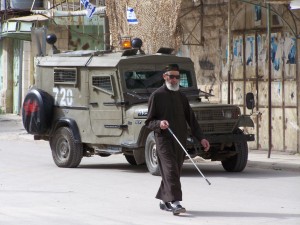The Middle East media frontline

By Khaled Diab
Pro-Israelis and pro-Palestinian need to join forces and find common ground in the no-man's-land of the media battlefield.
March 2009
The media is an important front in the Israeli-Palestinian conflict. That is why I ventured on to this particular battlefield with a slight sense of trepidation. I had been invited to address a group of Israeli and Jewish fellows (Read talk).
In order to build understanding and find common ground, I always welcome the opportunity to engage in dialogue with Israelis and Jews, both to challenge and be challenged. Moreover, the chance to address, and perhaps influence, tomorrow's possible opinion shapers was an additional lure.
There is a lot of controversy at the moment surrounding the issue of how the media covers the Israeli-Palestinian conflict, with both sides alleging bias against them. The exchange of fire over this issue became particularly heated during the recent conflict in Gaza.
After considering the cases put forward by various pro-Israeli, pro-Palestinian and independent media watchdogs, as well as anecdotal evidence, I outlined my reading of the complex and shifting media topography. A disclaimer first: it's difficult to make hard and fast generalisations about the media. In addition, bias can sometimes be in the eye of the beholder, and even the most well-intentioned and balanced journalist cannot be completely impartial.
Nevertheless, certain patterns are discernible. In the West, despite a closing of the gap in recent years, Israel's well-oiled media machine is still ahead, especially where it counts, while the Palestinians are way out front in the Arab world.
There is something of a transatlantic divide, with the American mainstream media firmly pro-Israeli, while the European media is often sympathetic to the Palestinians. That said, certain countries in Europe tend to be quite firmly pro-Israeli, such as in Germany and Poland, as well as the tabloid press in the UK. In the US, while opinion has hardened in favour of Israel in the conservative media, Palestinian perspectives are beginning to make inroads, especially in smaller and more liberal media outlets.
The Middle Eastern media is experiencing something of a paradox: with both a hardening and a softening of Israeli and Arab media perspectives in recent years. In addition, the explosion of online and satellite media content has made it increasingly difficult for Arabs and Israelis to insulate themselves from the views of the other side to the extent that was once possible.
I then went on to prescribe certain things the media could do, or do more of, to help advance the quest for peace – much of which I strive to implement in my own journalism. The media should be a channel for creative and novel approaches to the conflict, as well as a conduit for debate. It should highlight positives and not just fixate on negatives. Although we all know that violence makes headlines, non-violence should also be given prominent coverage.
There is a lot of demonisation going on. Journalists can help to counteract this by humanising the people on both sides of the divide. Bloggers, online forums and social networking sites are playing a crucial role in this respect.
Although I strive to make my position on the Israeli-Palestinian conflict as balanced and non-partisan as possible, I wasn't sure what kind of reception my message would get from this group of young people who are passionate about Israel and some of whom have been involved in pro-Israeli lobby groups such as AIPAC, with its fearsome reputation in Arab circles.
Most of the fellows made me feel welcome and the subsequent debate was generally civil and intelligent. Only two interventions riled me. One fellow disparaged Palestinians as being “liars” and “propagandists” and incapable of abiding to the same Western standards of “truth” as Israelis, that is why attempts to construct a more unified narrative were “intellectually shallow”, he argued. I explained to this fellow why I thought his analysis was a prime example of true intellectual shallowness.
The second was a regurgitation of that old orientalist chestnut that Arabs “only understand the language of violence”, and that's why Israel has to be tough and non-violence as a political ideology is a non-starter. I pointed out that, if one were so disposed, one could make the exact same generalisation about Israel, what with the Zionist dream of creating the tough “new Jew” that would ensure that the persecution of yesteryear would never be repeated, not to mention the Israeli adulation of the IDF. Jingoism knows no borders, but with the right leadership and perseverance, Israelis and Palestinians can move beyond that.
That aside, we discussed a broad range of issues, including the quality of media reporting, the banning of journalists from Gaza, press freedom in the Middle East, the value of citizen journalism and blogs, and more general political questions. The keenness with which the fellows engaged with me – we ran way over time – and their thirst for dialogue is a promising omen for the future.
I advised them that the best way for them to promote Israel's interests – and the same applies for pro-Palestinians – is to move beyond the narrow us and them dichotomy. The best support they can provide to their own side is to advocate the cause of justice for both Israelis and Palestinians.
We need more people who are willing to climb out of their trenches and venture into the no-man's-land and transform it into a common ground, even if it means occasionally getting caught in the crossfire.
This column appeared in The Guardian Unlimited's Comment is Free section on 18 March 2009. Read the related discussion.
This is an archive piece that was migrated to this website from Diabolic Digest.


